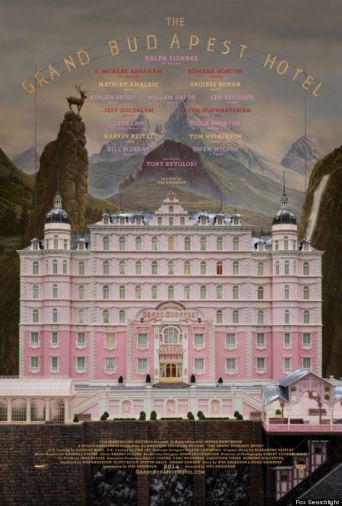 I have been a Wes Anderson fan ever since Mum told us to go to the neighbouring town to see The Royal Tenenbaums, because it seemed like a quirky little film. Quirky enough not to be shown at our local cinema, at least. I was a young teenager, and knew nothing about films except that I loved them. I think what I found in Wes Anderson’s strange family tale was a love of every aspect of movie-making. Even though I love his other films, it is only The Grand Budapest that finally replaced Tenenbaum as my favourite. Luckily, it doesn’t feel like a culmination, nor has his style gotten tired or overused. I can’t imagine a time when it will.
I have been a Wes Anderson fan ever since Mum told us to go to the neighbouring town to see The Royal Tenenbaums, because it seemed like a quirky little film. Quirky enough not to be shown at our local cinema, at least. I was a young teenager, and knew nothing about films except that I loved them. I think what I found in Wes Anderson’s strange family tale was a love of every aspect of movie-making. Even though I love his other films, it is only The Grand Budapest that finally replaced Tenenbaum as my favourite. Luckily, it doesn’t feel like a culmination, nor has his style gotten tired or overused. I can’t imagine a time when it will.
The story of the Grand Budapest Hotel is a story in a story in a story. A young girl goes to visit the grave of a famous author, whose book tells the story of the time he met the owner of the Grand Budapest Hotel, and this owner in turn tells of how he came into its possession. But in actuality, the movie is about the great concierge of the Grand Budapest, Gustave H., played by Ralph Fiennes, and his adventures, for lack of a better term.
There is really nothing more to say than this: if you like anything Wes Anderson has done before, you will find something to love here. If you find his style not to your taste, then be warned this is a perfect example of his form and this is not the film for you. I fall into the first category, unashamedly.
It does at times feel like a return to an old theatre, one you visit whenever you’re in town. All the same actors are there, all doing their very best in new and strange roles you never imagined them in, but now can’t picture anyone else pulling off. The director has a new and grand vision, and every background and prop has been worked to his exact standards. The curtains open on opening night, and all is right with the world.
The story was surprisingly complicated this time. There’s an old lady with a huge fortune, and for a moment it feels like a murder mystery, only the film isn’t interested in that plot. Gustave H. has better things to worry about. The film never sits still, and feels very quick compared to some of his other movies. You have the long tracking shots that frame the space as precisely as ever, but there is a higher energy-level about them. This is no doubt helped by the absolutely fantastic score. When Adrien Brody stalks down the pink corridors of the Grand Budapest, the organ music reaches a divine crescendo.
I find it intriguing that Wes Anderson manages to make me feel nostalgic for a time and place that never existed. It feels like a homage to that grand era in old Europe, with high-altitude hotels for the rich and lazy, but the place is also a fairytale with beautifully painted storybook/theatre backdrops and toy-like sets. The colours and the patterns, and Anderson’s framing all add to that pop-out book feel. Some things are so opulent they’re ridiculous. Mendl’s cakes, which appear throughout the film, are tiny towers of indulgence to the point of being slightly disgusting.
To me, Wes Anderson films always invoke a sense of endless summer. I think about those stories we made up without thoughts about pretense or unoriginality. There’s always heart at the centre, past all the staging and eccentric characters. Even when his films are slow or problematic for me, they always pull me in again by the end and sort of settle down.
The Grand Budapest Hotel is a fictional place that never looks real, but you still feel like you could go there and have Gustave H. take care of all your needs.
Dice roll: 6
